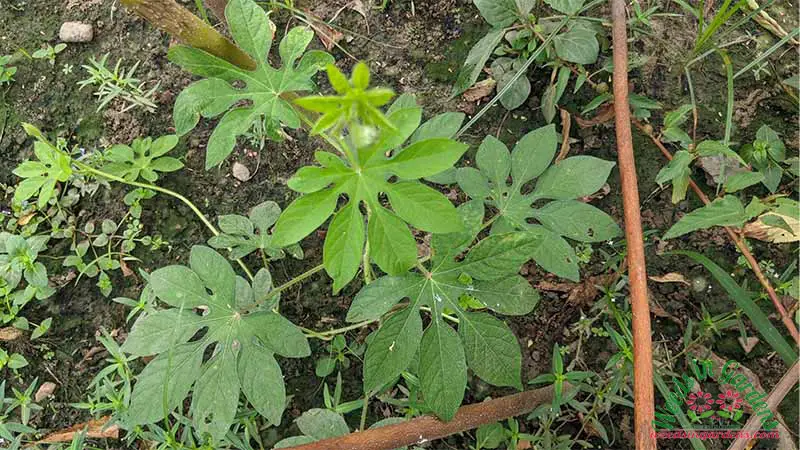Ipomoea pes-tigridis, also known as the “Tiger Tail Morning Glory” and “Tiger Foot Morning Glory” is a beautiful and vibrant plant that is popular among gardeners. However, it is also known for its invasive nature and its ability to spread quickly, making it important for gardeners to understand its characteristics and potential effects on the environment. Despite its negative impact on native ecosystems, there are still some uses for this plant that make it valuable in certain circumstances.

Characteristics
Ipomoea pes-tigridis is a fast-growing, vining plant that can reach a length of up to 12 feet. The heart-shaped leaves have a glossy green color. The flowers of the Tiger Tail Morning Glory are its standout feature, with their vibrant orange and yellow petals and unique striped pattern. These blooms can reach up to 4 inches in diameter and appear from summer through fall.hes in diameter and appear from summer through fall.
It is important to note that in many areas, Ipomoea pes-tigridis is considered an invasive species and can have negative impacts on native ecosystems. Gardeners should consider alternative plants that are not invasive and take steps to control the spread of Ipomoea pes-tigridis when cultivating it.
Invasiveness
Ipomoea pes-tigridis is considered an invasive species in many areas, as it can quickly spread and displace native vegetation. This plant produces many seeds, which can easily be carried by wind or water, leading to its rapid spread. Additionally, its fast-growing vines can smother and cover other plants, making it difficult for native species to thrive.
Effects on the Environment
The invasiveness of Ipomoea pes-tigridis can have significant effects on the environment. It can lead to the loss of native plant species and disrupt ecosystems, which can negatively impact wildlife. In addition, its ability to spread quickly can make it difficult to control and remove, leading to costly efforts to manage it.
Controlling Its Spread
To prevent the spread of Ipomoea pes-tigridis, it is crucial to control its growth and limit its seed production. Some tips for controlling its spread include:
- Remove any existing plants: If you have Ipomoea pes-tigridis in your garden, it is important to remove it completely to prevent it from spreading further.
- Prevent seed production: Cut off the flowers before they have a chance to produce seeds.
- Dispose of seeds properly: When removing Ipomoea pes-tigridis, be sure to dispose of the seeds properly, as they can easily spread if left in the environment.
- Plant native species: To promote biodiversity and prevent the spread of this invasive species, consider planting native plants in your garden.
Benefits of Tiger Foot Morning Glory
Ipomoea pes-tigridis is an excellent addition to any garden or home due to its ornamental value. The bright and bold flowers add a pop of color to your garden and can attract pollinators like butterflies and hummingbirds. Additionally, this plant is easy to grow and care for, making it a great choice for those new to gardening.
Ornamental Uses
The vibrant flowers of Ipomoea pes-tigridis make it a popular ornamental plant for gardens, patios, and balconies. Its fast-growing vines and ability to cover large areas with its bright flowers make it an excellent choice for adding color and interest to outdoor spaces.
Erosion Control
Ipomoea pes-tigridis can also be used for erosion control. Its fast-growing vines and deep roots can help to stabilize soil and prevent erosion, making it a useful plant for landscaping on slopes and banks.
Green Fences
The dense growth of Ipomoea pes-tigridis can also be used as a green fence to provide privacy and shade. Its fast-growing vines can quickly cover walls, fences, or trellises, making it a practical and attractive solution for privacy and shade needs.
Medicinal Uses
In traditional medicine, Ipomoea pes-tigridis has been used to treat various ailments, including headaches, rheumatism, and insomnia. Its leaves and roots have been used in decoctions, infusions, and poultices for their medicinal properties.
Toxicity
Tiger Foot Morning Glory has toxic properties and is not recommended for consumption by humans or animals. This plant contains several toxic alkaloids, including ergoline and lysergamide, which can cause symptoms such as hallucinations, vomiting, and drowsiness when ingested. So, it is crucial to be aware of its toxic properties and to exercise caution when handling or growing this plant.
If you suspect that you or an animal has ingested Ipomoea pes-tigridis, it is important to seek medical attention immediately. Treatment may involve decontamination, supportive care, and monitoring of symptoms, and the prognosis will depend on the amount ingested and the individual’s overall health.
Care Tips
- Planting: Ipomoea pes-tigridis is a versatile plant that can be grown in the ground in or a pot. It can grow in partial shade to full sun and loves well-drained soil.
- Watering: Water the plant regularly to keep the soil moist, but avoid overwatering as this can lead to root rot.
- Fertilizing: Fertilize your Ipomoea pes-tigridis every 2-3 weeks in the growing season with a balanced, water-soluble fertilizer.
- Pruning: Prune the plant regularly to promote bushier growth and encourage more blooms.
In conclusion, Ipomoea pes-tigridis is a versatile and attractive plant that has a variety of uses, but it is important to understand its invasive nature and to cultivate and manage it responsibly. Whether you are using it for ornamental purposes, erosion control, green fencing, or for its medicinal properties, it is important to take steps to prevent its spread and protect the environment. By understanding its invasiveness and taking steps to control its spread, gardeners can help protect the environment and promote biodiversity.
